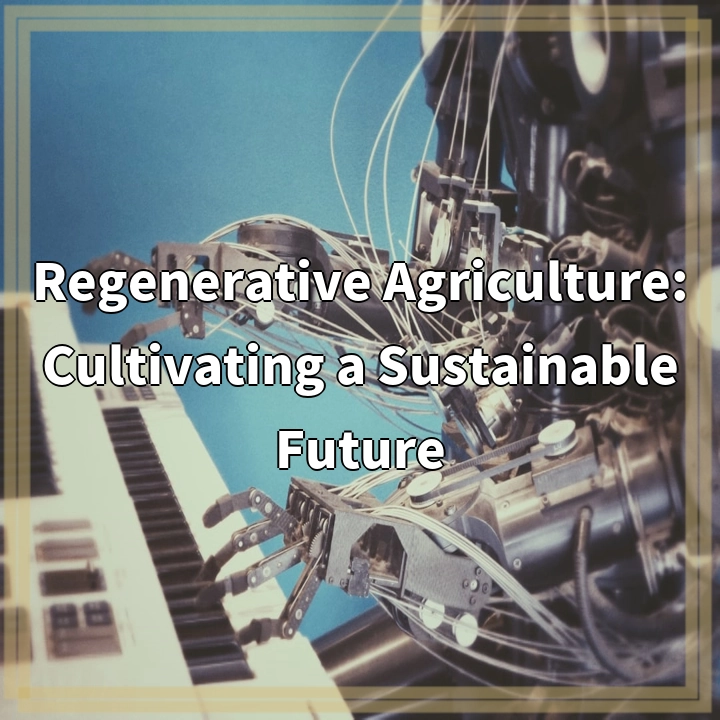Physical Address
304 North Cardinal St.
Dorchester Center, MA 02124
Physical Address
304 North Cardinal St.
Dorchester Center, MA 02124

Regenerative agriculture is a holistic farming approach that focuses on restoring and enhancing the health and biodiversity of farms and ecosystems. This innovative method goes beyond traditional sustainable practices by actively seeking to regenerate soil health, improve water cycles, increase biodiversity, and restore ecological balance.
At its core, regenerative agriculture works through a set of principles designed to revitalize the farm ecosystem. These include:
Prioritizing building healthy, living soils to improve fertility and structure.
Encouraging diverse crops and livestock to promote resilience against pests and diseases.
Implementing practices that enhance water retention and minimize runoff.
Capturing atmospheric carbon and storing it in the soil, helping combat climate change.
Taking into account ecological, social, and economic factors in decision-making.
Despite its promising benefits, the adoption of regenerative agriculture faces various real-world challenges that hinder its widespread implementation.
Many farmers lack the necessary training and understanding of regenerative practices. Transitioning from conventional to regenerative methods can be daunting, and without proper education, farmers may be hesitant to make the shift.
Implementing regenerative agriculture can require upfront investments in new practices, equipment, and certifications. Many farmers may struggle with the financial burden of transitioning their operations, especially if they rely on cash crops with conventionally proven economic models.
There is often limited market demand for products produced through regenerative methods, making it challenging for farmers to find buyers. Additionally, the existing supply chains and infrastructure are often not designed to support regenerative practices, creating further obstacles.
Climate change introduces unpredictability in weather patterns, making it difficult for farmers to rely on regenerative practices without knowing how these conditions will impact their crops and livestock. This variability can discourage experimentation and adoption of new methods.
Current agricultural policies often favor conventional farming practices, providing subsidies and support that do not align with regenerative principles. This lack of policy support can create an uneven playing field, making it harder for regenerative agriculture to compete.
In some communities, there may be skepticism or resistance to change traditional farming practices. Cultural and social norms can deeply influence farming methods, making it a challenge to shift mindsets towards regenerative approaches.
To effectively address the challenges of regenerative agriculture, a combination of education, financial support, policy changes, and community engagement is essential. Here are several key solutions that can facilitate the broad adoption of regenerative practices.
Establishing comprehensive education and training programs specifically designed for farmers can help bridge the knowledge gap. Workshops, online courses, and mentorship initiatives can provide practical skills and insights into regenerative practices, enabling farmers to transition more confidently.
Providing financial assistance in the form of grants, low-interest loans, or subsidies can help farmers afford the initial investments required for adopting regenerative methods. Additionally, connecting farmers with investment opportunities tailored to sustainable practices can encourage the transition.
Increasing awareness among consumers regarding the benefits of regenerative products can stimulate market demand. Initiatives that promote regenerative agriculture products, such as certifications or labeling schemes, can also help consumers make informed choices and support local farmers.
Engaging with policymakers to create supportive agricultural policies that favor regenerative agriculture is crucial. This may include incentives for farmers adopting sustainable practices, funding for research into regenerative methods, and establishing programs that promote soil health and biodiversity.
Building a sense of community around regenerative agriculture can help overcome social resistance. Creating platforms for farmers to share experiences, success stories, and best practices fosters collaboration and supports a culture of innovation and change.
Investing in research focused on climate-smart agriculture and regenerative practices can provide valuable insights into enhancing resilience in farming systems. Innovations in technology, bioengineering, and ecological research can help farmers adapt regenerative practices to changing climatic conditions.
By implementing these solutions, the shift towards regenerative agriculture can become more feasible, paving the way for a more sustainable and resilient agricultural future that benefits both the ecosystem and local communities.
If you’re wondering where the article came from!
#